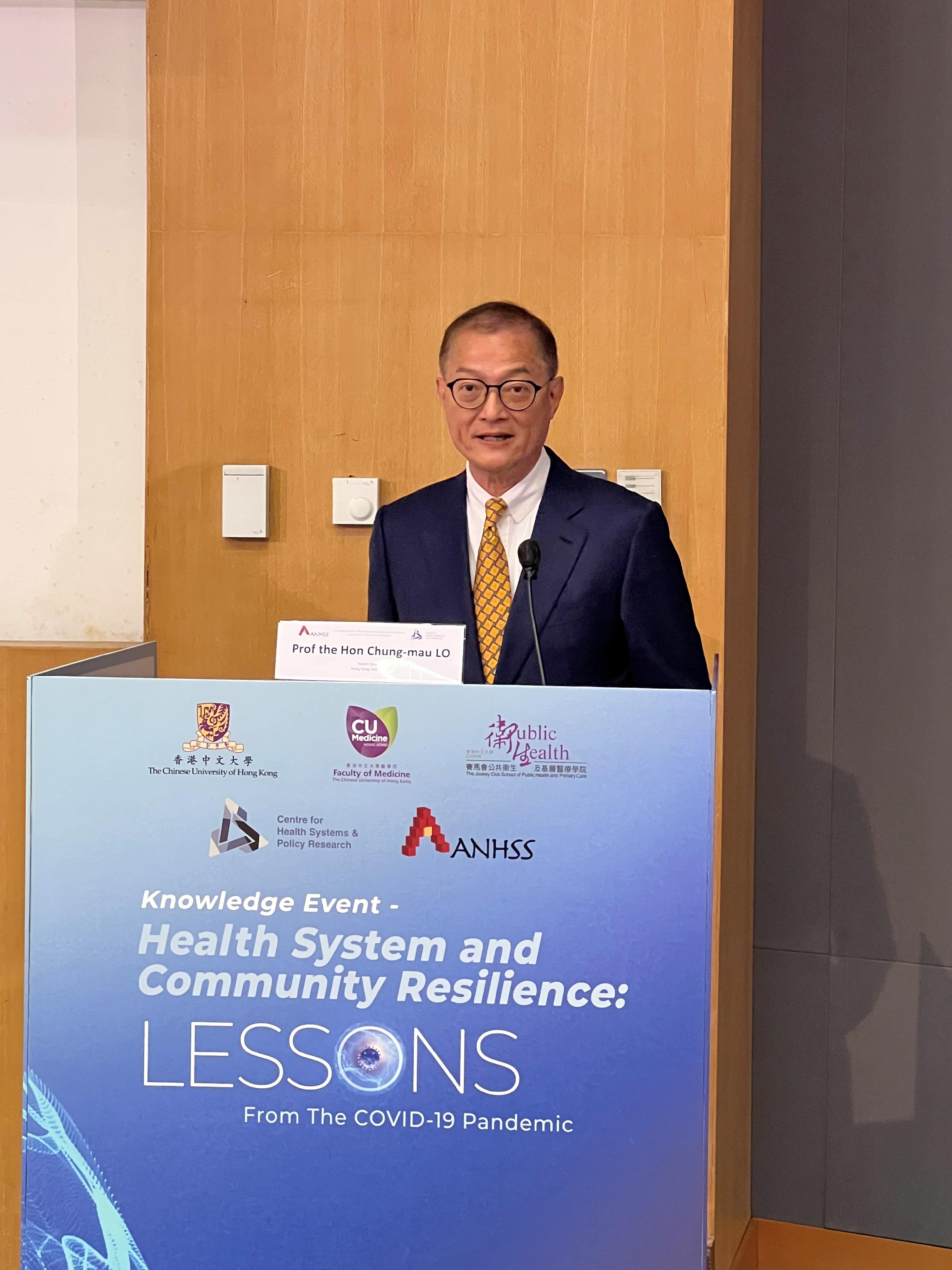Speech by Secretary for Health at opening ceremony of Knowledge Event and Policy Course – Asia Pacific Network for Health Systems Strengthening (English only) (with photo)
Following is the speech by the Secretary for Health, Professor Lo Chung-mau, at the opening ceremony of the Knowledge Event and Policy Course – Asia Pacific Network for Health Systems Strengthening today (December 4):
Professor Francis Chan (Dean of the Faculty of Medicine of the Chinese University of Hong Kong), Professor Samuel Wong (Director of the Jockey Club School of Public Health and Primary Care of the Chinese University of Hong Kong), Professor Yeoh Eng-kiong (Director of the Centre for Health Systems and Policy Research of the Jockey Club School of Public Health and Primary Care of the Chinese University of Hong Kong), distinguished guests, ladies and gentlemen,
I am delighted to be here with you today to officiate at the opening ceremony of the Knowledge Event and Policy Course – Asia Pacific Network for Health Systems Strengthening (ANHSS). I wish to extend a warm welcome to all of you, especially experts and friends from the Mainland and overseas.
Today’s Knowledge Event, entitled “Health System and Community Resilience”, is timely for us to take stock of the experiences from COVID-19 and to provide pointers for ramping up resilience in the public health systems in future. I am sure that we will all benefit from the presentations and exchanges today where policy makers and experts from different places gather here to share their COVID-19 journeys and insight on public health system resilience. My best compliments to Professor Yeoh and his team at the Centre for Health Systems and Policy Research of the Jockey Club School of Public Health and Primary Care, as well as the ANHSS for organising this meaningful event. I am sure that it will be a resounding success.
Public health systems are the bedrock to safeguard the life and limb of the general public. They are the bulwark against serious threats to public health, such as the onslaught of the COVID-19 pandemic. The COVID-19 pandemic was as much an ordeal as providing an opportunity for policy-makers and public health experts to thrash out innovative and effective approaches to tackle novel and emerging diseases, to reinforce healthcare systems, and to weave closer collaboration networks with community stakeholders as well as regional and international collaborators. To this end, enhancing resilience in preparedness, readiness, response and recovery is a lynchpin for effective actions and reactions in future. Collaboration between the Government and the community has played and will continue to play an indispensable role to safeguard public health. This calls for enhancing the resilience of not just the public healthcare system but also every member of the community.
While Hong Kong has built up resilience and successfully tackled multiple waves of the COVID‑19 pandemic, we are committed to refining our tools and gearing up ourselves to prepare for the next epidemic, which no one knows for sure when will strike. With the support of our long-term community partner, the Hong Kong Jockey Club, the Hong Kong Special Administrative Region (HKSAR) Government will enhance the local capacity in epidemic surveillance and early warning and prevention and control, strengthen the joint disease prevention and control as well as manpower training with the Mainland authorities, and promote international co-operation in scientific research in various areas.
The COVID-19 pandemic has demonstrated the critical importance of a strong primary healthcare infrastructure and workforce within the community. At the same time, it has also exposed and exacerbated the financial burden on our healthcare system and the social costs of chronic diseases. A robust primary healthcare system will be an important line of defence against a wide range of potential public health crises. In this connection, the HKSAR Government released the Primary Healthcare Blueprint late last year, setting out the development direction and strategies for coping with the challenges brought about by an ageing population and the increasing prevalence of chronic diseases. We are pressing ahead with our work on various fronts, including the setting-up of District Health Centres in all of the 18 districts, advocating “family doctor for all”, enhancing the Elderly Health Care Voucher Scheme, launching the Chronic Disease Co-Care Pilot Scheme, better utilising multidisciplinary healthcare services, etc, with a view to providing comprehensive, sustainable and people-centric primary healthcare services in the community. This will help us build a healthier Hong Kong that will be better prepared when the next emerging disease strikes.
Today’s Knowledge Event is a great opportunity for key policy makers and academics from the public health sector from different places in the Asia-Pacific region to share their experience on how they collaborated with their community to prepare, respond, mitigate and adapt in the face of one of the greater public health threats in modern history. Like you, I am eager to learn about transformation of health systems and strategies for institutionalising the knowledge gained for health systems and community resilience. At closing, I wish the event a great success and everyone excellent health. Thank you very much.


